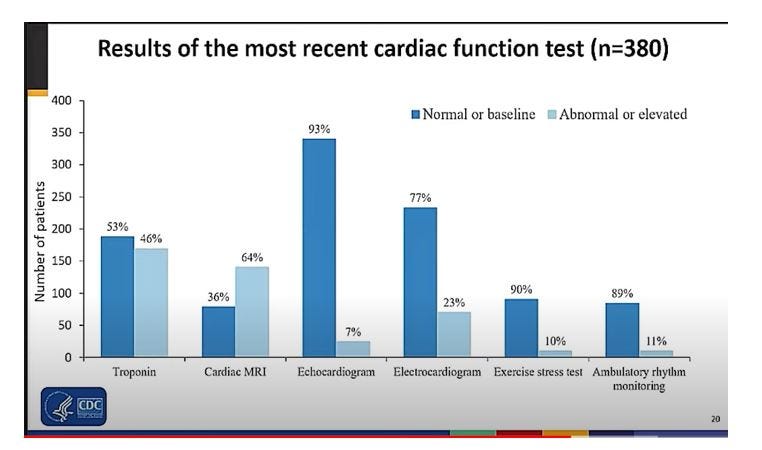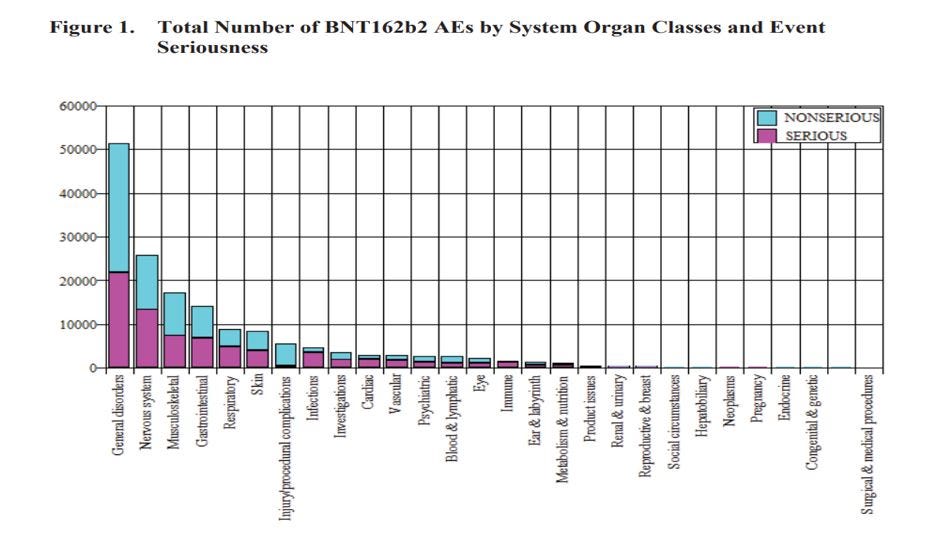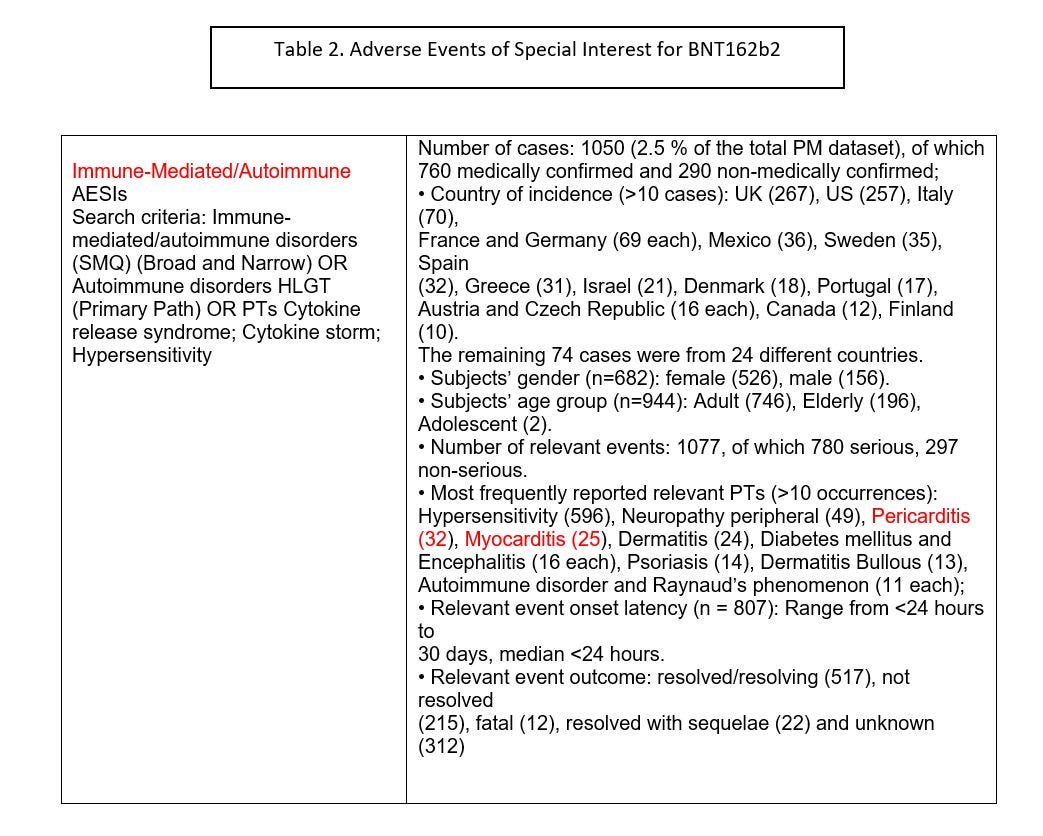Why vaccine induced Myocarditis and Pericarditis are conditions that won't "just go away"
How much do we really know about vaccine induced myocarditis and Pericarditis, especially when there is no long term studies.
We have constantly heard and continue to hear that myocarditis is "mild and rare," and the benefits of the vaccine out weights the risk. We are also informed that myocarditis is self-limited and will resolve with little consequence. The CDC still has the following advice on their website:
However, a study from the CDC paints a different picture. On February 4, 2022, the CDC provided the results of their myocarditis study, which examined 380 patients between 12-29 years of age, 90 days after their myocarditis diagnosis. The study found that:
4% were readmitted to the hospital
20% were prescribed heart medication
18% had missed work or school within the last two weeks
49% still experiencing symptoms within the previous two weeks
45% had anxiety or depression
In addition, diagnostic testing shows that most patients diagnosed with vaccine-induced myocarditis still had abnormalities on their cardiac MRI (64%), and 46% of patients still had abnormal troponin levels.
Despite these results, the CDC was quick to conclude that "at least 90 days after myocarditis diagnosis, most patients reported no impact on their quality of life, and most did not report missing school or work."
According to the patients' health care provider, 66% stated that the patient was fully recovered, and 15% stated that the patient was probably fully recovered. The study was extremely small, with only 380 patients, and looked at a snapshot in time. I would label the results of the study as mixed.
What is Myocarditis
Despite messaging from health authorities regarding the "rare" and "mild" nature of myocarditis, it is not and should not be an acceptable risk of a medical intervention given to a healthy individual, especially children and young people. According to the Mayo Clinic website, myocarditis and pericarditis are defined as inflammation: (Mayo Clinic, 2021):
“Myocarditis is the inflammation of the heart muscle. The inflammation can reduce the heart's ability to pump and cause rapid or irregular heart rhythms (arrhythmias). Infection with a virus usually causes myocarditis. Sometimes myocarditis can result from a reaction to a drug or be part of a more general inflammatory condition. Signs and symptoms of myocarditis include chest pain, fatigue, shortness of breath, and rapid or irregular heartbeats. Severe myocarditis weakens the heart so that the rest of the body doesn't get enough blood. Clots can form in the heart, leading to a stroke or heart attack”.
“Pericarditis is swelling and irritation of the thin, saclike tissue surrounding your heart (pericardium). Pericarditis often causes sharp chest pain and sometimes other symptoms. The chest pain occurs when the irritated layers of the pericardium rub against each other.”
In addition the Mayo Clinic also provides complication of myocarditis which are serious consequences especially for a previously young and healthy individual (Mayo Clinic, 2021).
· Heart failure. Untreated, myocarditis can damage your heart's muscle so that it can't pump blood effectively. In severe cases, myocarditis-related heart failure may require a ventricular assist device or a heart transplant.
· Heart attack or stroke. If your heart's muscle is injured and can't pump blood, the blood that collects in your heart can form clots. If a clot blocks one of your heart's arteries, you can have a heart attack. If a blood clot in your heart travels to an artery leading to your brain, you can have a stroke.
· Rapid or irregular heart rhythms (arrhythmias). Damage to your heart muscle can cause an arrhythmia.
· Sudden cardiac death. Certain serious arrhythmias can cause your heart to stop beating (sudden cardiac arrest). It's deadly if not treated immediately.
We may have already seen the consequences of myocarditis since reports of cardiac side effects from the vaccine are exploding in the VAERS database. Dr. Jessica Rose, who has a Ph.D. in computational biology, has extrapolated the cardiac adverse events from the VAERS database from two distinct periods, 2021, the year the covid-19 injections began, and 2019. Comparing the two charts, it is strikingly obvious that cardiac events have increased dramatically in every age group from 10 years old to 90 years of age, with the highest reports in those 30-40 years of age. (Rose, 2021).
Pfizer post-authorization adverse event data
Pfizer also collected vaccine adverse reactions from their mRNA biological product during this early period. The table below shows data between December 2020 to February 28, 2021, Pfizer received 42,086 cases of adverse reactions, with over 100+ diseases listed and containing 158,893 adverse events. In comparison, the fact sheet provided to doctors and health authorities mentions only minor adverse reactions requiring no treatment. Pfizer's own report, Cumulative analysis of post-authorization adverse events, indicates the following cardiac-related serious adverse events: myocarditis (25), pericarditis (32), tachycardia, arrhythmia, myocardial infarction (heart attack), cardiac failure, acute myocardial infarction, cardiogenic shock, postural orthostatic tachycardia syndrome, and coronary artery disease. These were all reported in a period of only two and a half months (Pfizer, 2021).
It is worth noting that Pfizer has categorized myocarditis and pericarditis under autoimmune adverse reactions, and not under cardiac related reactions. The Pfizer post-authorization adverse events report alone should have been sufficient to end the rollout of the mRNA vaccine. To see the full report, please see the link here.
Myocarditis- an Autoimmune condition
It is important to understand that myocarditis is an autoimmune condition, not a cardiac condition, this is an important distinction because autoimmune conditions are chronic conditions that have environmental triggers. The question then becomes, what is the trigger?
In a study published in May of 2021, "Circulating Severe Acute Respiratory (SARS-CoV-2) vaccine antigen detected in the plasma of mRNA-1273 Vaccine recipients," researchers found spike protein circulating in the blood of the vaccinated. According to the study, after the first dose of the Moderna injection, the study detected subunit S1 protein of the SARS-Cov2 virus in the blood plasma of 11 of 13 young healthcare workers. Spike protein was detected on average five days after the 1st dose, and 3 out of the 13 participants still had detectable spike protein on day 15. After the second dose, only 1 participant had detectable spike protein on the second day, which disappeared two days later (A. F. Ogata, 2021). In the conclusion of the study, the researchers allude to an autoimmune reaction following vaccination.
“We hypothesize that the cellular immune responses triggered by T-cell activation, which would occur days after the vaccination, lead to direct killing of cells presenting spike protein, and an additional release of spike protein into the bloodstream. The mechanisms underlying release of free S1 and the subsequent detection of the intact spike protein remain unclear and require further studies.”
Could the spike protein be the trigger? The very substance that they are injecting into your body? The mRNA vaccines carry a code that instructs your body to create the very protein that is triggering an autoimmune condition within your body. Myocarditis is a serious autoimmune condition that can lead to serious complications such as heart failure? Will we start seeing 20-year-olds with vaccine-induced heart failure?
What are the implications then for boosters? Will vaccinating the already vaccinated with boosters lead to more cases of myocarditis or pericarditis? In a recent headline looking at this very issue an athlete developed pericarditis following her 3rd shot.
· Swiss sprinter Sarah Atcho diagnosed with pericarditis after Pfizer booster shot. News.com.au January 20, 2022.
In a study published in December 2021, titled “Risk of myocarditis following sequential covid-19 vaccination by age and sex,” the researchers found that myocarditis risk was increased during the first 28 days after the third injection with the Pfizer vaccine (M. Patone, 2021).
“For the first time, we observe an increase in myocarditis events following a third dose of the BNT162b vaccine. Whist the incidence rate ratio are higher sequentially following each dose of mRNA vaccine… the risk following Covid-19 vaccination was largely restricted to younger males aged less than 40 years.”
Covid-19 vaccines and the exploding Autoimmune Disease
In a conference hosted by Doctors for Covid Ethics, Symposium II, Dr. Sucharit Bhakdi, an immunologist, explains the mechanism by which the covid-19 vaccines can cause an autoimmune reaction (Bhakdi, 2021).
“Once this gene is injected into your muscle, you have to realize that it is going to your bloodstream. Anyone who says otherwise is lying to you. Once in the bloodstream, it goes to the lymph nodes and invades the cells of the lymph nodes. Now the cells of the lymph nodes and the cells that contact the bloodstream will make the spike protein. Any cell that dares to make this spike protein will be attacked by your immune system because your immune system knows this virus, the coronavirus, which has been around from the beginning of mankind. After the first shot, within hours and a few days, the first arm of the immune system tries to remove those cells that make the spike protein.”
“When you do this a second time, it will be much worse. The whole army of the immune system will come to destroy the vessel wall that is making the spike protein, and then the gene will seep out of the vessel wall into your organs, such as your heart, liver, and spleen. Those cells will start making the spike protein. The killer lymphocytes that patrol your body will go into these organs and try to destroy them. What we have to fear is going to happen is a massive self to self-attack of the immune system on all organs of your body that produce the spike protein. Could this explain the myriad of clinical symptoms of adverse events such as myocarditis, stroke, and myocardial infarction?”
What Dr. Bhakdi is describing is an autoimmune attack of body organs that expresses the spike protein, which could only be caused through vaccination with a gene-based vaccine such as the mRNA or viral vector DNA vaccines. The next question that needs to be asked is if the vaccine is causing an autoimmune response, in this case myocarditis and pericarditis, how would it ever go away? The answer is it that individuals with vaccine induced myocarditis now have a chronic health condition that will always need to be managed. It will never go away.
You can thank the vaccine manufacturers, government agencies and anyone else who said that vaccines are safe and effective.
References
Pfizer. (2021, April 30). 5.3.6. Cumulative analysis of post-authorization adverse events report of PF-07302048 (BNT162B2) received through 28-Feburary-2021. Retrieved from Phmpt.org: https://phmpt.org/wp-content/uploads/2021/11/5.3.6-postmarketing-experience.pdf
M. Patone, X. M. (2021, December). Risk of myocarditis following sequential Covid-19 vaccination by age and sex. . Retrieved from MedRxiv.com: https://www.medrxiv.org/content/10.1101/2021.12.23.21268276v1.full.pdf
Symposium II – Doctors for COVID Ethics (doctors4covidethics.org)
References are also linked into document.
Also by H.T.Nguyen….Learn the truth about vaccine-induced myocarditis & Share the truth about vaccine-induced myocarditis. available on amazon.com. amazon.ca amazon.co.uk amazon.com.au










